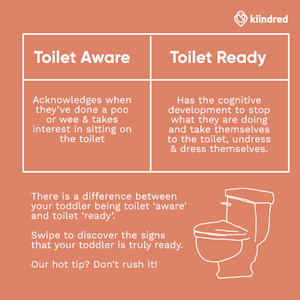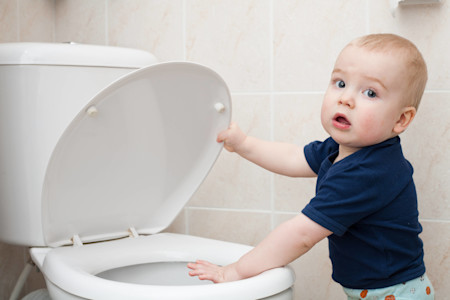Tips for toilet training your toddler
Kiindred
Kiindred
Up next
Toilet training can strike fear even in the most seasoned of parents. Sure you’re sick of changing pooey nappies, but the idea of cleaning up poo and wee off the floor (or worse!) doesn’t exactly sound appealing either. But with a little preparation and these helpful tips, you will be saying see-ya to the nappies in no time!
What age should my toddler do toilet training?
This is a tricky one. Often parents decide there is a certain time they want or need their toddler to be toilet trained by. But every child is different and this approach is setting you and your little one up for failure.
You should decide when to start training your toddler based on when they are developmentally and emotionally ready. There is a big difference between toilet aware and ready.
Many children will be showing signs they are ready for potty training around 18-24 months, but others may not until much later. Training boys will typically start later than for girls and will often take longer.

Signs your toddler is ready for toilet training
How will you know when your toddler is ready to ditch the nappies? Some signs they are ready to begin training include:
- They are asking to do it
- They ask to have their nappy changed as soon as they have done a wee or poo
- Ability to follow simple instructions
- Verbal communication skills to tell you they need to go
- They can dress and undress themselves
- Has regular well-formed bowel movements
- Ability to stop what they are doing and go to the bathroom
- Ability to sit still on the toilet
Sign up
Get tailored content based on your week of pregnancy
By signing up, you agree to receiving our Newsletters. Cancel anytime.



When to avoid (or delay) toilet training?
Learning to use the toilet is a huge skill for our little ones. It’s a good idea to begin when there are no other big changes or things going on in their lives or holidays.
You are best to avoid starting when:
- There is a new sibling
- When they are moving to a new bed (one big change at a time if you can help it!)
- Moving house
- Moving or starting a new
- If your child is sick
Toilet training takes a lot of time, commitment and patience from you. Make sure you have the time to dedicate to helping them through it too. Taking a few days off work if you can, or start the training on a Friday so you can dedicate all weekend to being at home to help them.
Mothercraft nurse Chris Minogue recommends aiming for the summer closest to when they are 2.5 years old. Summer = fewer layers of clothing to remove and to wash!

Tips for toilet training
- Talk to your child in the lead up to toilet training to help prepare them. Have discussions and read books to prepare them mentally rather than springing it on them.
- Buy your child some new special underwear with their favourite character or colour.
- Always use positive language and help them feel excited about the process. Make them feel special and grown-up and never get angry or annoyed at them for accidents.
- Praise any attempts – whether successful or not, or even if they don’t end up going. It’s all part of the process. Just getting them into the bathroom is a start.
- Decide whether you’ll use a potty or go straight to the toilet. You can purchase toddler seats that sit on top to make it a little easier for their little bottoms and less scary. Chris Minogue recommends avoiding using a potty because you won’t be able to take these with you when you are out and about. If they can get used to going on a toilet straight away this can be helpful.
- Boys often learn to go sitting down and then once they grow (and are tall enough to reach) can move to stand to wee. This will be much easier on you for the clean up as they often struggle with their aim until they are a little older!
- You will want to stay close to your child during those first few days and ask them often if they need to go to the bathroom.
- You may like to work to a structured schedule taking them to go 30-45 minutes after waking or having foods and liquids.
- Only let them sit for a few moments each time. If they do not go then try again in another 15 minutes. Once they do go, wait around 2 hours and then start asking them again.
- Some children have a bowel movement at roughly the same time every day which can be helpful. But don’t be surprised if this changes slightly once they begin. Some children may hold on to their bowels if they are feeling nervous or uneasy. Or some may go more often for the same reason.
- You can also look for visual cues such as squatting, straining, holding their crotch.
- Expect accidents! It’s going to be a messy few days, so you need to accept this. Accidents are inevitable and are par for the course. Just remember to stay positive and keep encouraging them.
- Try not to schedule any major plans or outings out of the house for at least the first couple of days. This will ease any added pressure on you and them.
- Some parents find a rewards system help. So offering sticker charts, food or a bigger reward once they are fully trained. This is a personal preference and may depend on how your child responds to a rewards system. Remember that if they get used to getting a treat every time they go you’ll have to wean them off this eventually! You might like to try offering some special reading time together or a trip to their favourite park instead.
Navigate toilet training with ease with Chris Minogue’s toilet training course as part of our Kiindred expert series here.
Remember not to rush the process. As adults, we take something as simple as going to the bathroom for granted but it is a huge developmental step for our children and one that requires time, patience and lots of love and encouragement.
If they are resisting or struggling with it, ask yourself if they are really ready? Perhaps you might want to think about trying again in a few weeks time.
But that said, we know it’s not easy on the parents either so make sure you are stocked up on wine or chocolate (or whatever your go-to after a tough day is!) Because you will need it! But just think about all those nappies you won’t have to change anymore and all the money you’ll be saving…
Related Articles
Kiindred
Follow +Brought to you by the Kiindred Editors. Our team are committed to researching and writing on all the things we know you will want to know about, at each stage of your pregnancy and parenthood journey.









